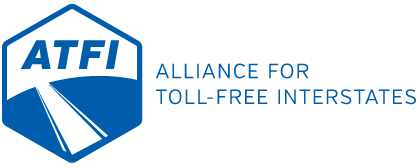With a federal gas-tax increase off the table for now, a new group of trucking and business interests is trying to put a stop to the most obvious alternative for funding maintenance and construction of the nation’s interstate highway system: tolling.
Officially launched in February of this year, the Alliance for Toll-Free Interstates is pushing the position that “a long-term sustainable funding source for transportation infrastructure in this country must not include the tolling of current federal interstate capacity,” said spokesperson Hayes Framme. Members include McDonald’s, Dunkin’ Donuts, FedEx, UPS and the American Trucking Associations.
The group came together in response to growing pressure in states to impose tolls on portions of the interstate system that fall within their borders. The federal government is already running a pilot program which allows up to three states to place tolls on existing interstate capacity. Current participants are Virginia, North Carolina and Missouri.
An Interstate 376 trailblazer with the new bla... (Photo credit: Wikipedia)
Despite heavy political opposition, those and other cash-strapped states are now seeking to expand the 15-year-old pilot to allow for additional tolling. ATFI claims the effort would be hugely inefficient and wasteful of taxpayer dollars. An economic assessment by Virginia found that in the first six years of the program, 38% of collected revenues would go toward construction and maintenance of the toll facility itself, Framme said. (Over 25 years, the amount would drop to 16%.) By comparison, he said, administration of the federal fuel tax consumes less than 1% of the money generated.
Allowing tolls on top of a fuel tax amounts to double taxation of drivers, the alliance says. At the same time, the group rejects the alternative of “value-added” tolling, laid out in a recent article from the libertarian Reason Foundation. Author Robert Poole says the model would replace fuel taxes and make tolling “a true highway user fee,” with revenues limited to paying for the roads being tolled.
ATFI responds that tolling is an inefficient alternative to the fuel tax and is based on overly optimistic projections of traffic and revenues. In addition, it notes, the model relies on an untested vehicle miles tax (VMT) to fund maintenance and construction of non-interstate roads.
“Not a single state has successfully placed tolls on existing interstate capacity to date, and VMT pilot programs are in their infancy at best,” ATFI says. “These assumptions are completely unrealistic for the foreseeable future.”
The federal fuel tax has stood at 18.4 cents per gallon since 1993. Inflation has eroded the tax over the years, to the point where the Highway Trust Fund is expected to go broke late this summer. But stiff opposition within Congress to any new tax has made that option unviable.
ATFI is concentrating for the moment on “ensuring that tolling on existing interstate capacity does not become an option,” said Framme. At the same time, “we do encourage members of Congress to roll up their sleeves and take a look at the serious options on the table.” Short of dipping into the general treasury, that essentially means a tax increase, although ATFI has not come out in support of that action.
ATFI is not opposed to the imposition of tolls on newly constructed roads, provided that drivers are given non-toll options. Premium-priced “hot” lanes, available during peak traffic hours, are becoming increasingly popular in states and local communities.
“The important factor for our members is choice,” said Framme. “The key is that people should still have access to untolled existing capacity.”
Supporting the use of tolls for road improvements is the International Bridge, Tunnel and Turnpike Association. The group of toll-facility operators and related businesses supports the Reason Foundation’s idea of value-added tolling. Executive director and chief executive officer Patrick D. Jones said in a statement that the growing use of electronic collection technology makes tolls “easier to implement, cheaper to collect and more acceptable to the public than ever before.”
With toll financing, Jones said, “people know where their money is going. It goes to retire the toll road debt, support toll road operations, and pay for the vital maintenance needed to preserve the roadway.”
Considering the current anti-tax sentiment in Congress, and the pressing need for a way to fund critical infrastructure improvements, ATFI has a battle on its hands. At the very least, it’s fighting to prevent expansion of the existing federal pilot program. Beyond that, it hopes to scuttle the program altogether, and maintain the 58-year-old ban on tolling on the interstate highway system.
“I don’t have a sense right now if we’re going to be screaming victory at the end of the day,” said Framme, “but we’re going to continue doing what we do.”
UPDATE: This story was corrected to clarify the position of the Alliance for Toll-Free Interstates. It does not support an increase in the federal gas tax.

